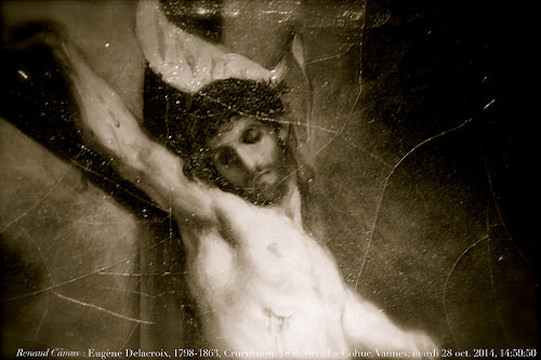We run our website the way we wished the whole internet worked: we provide high quality original content with no ads. We are funded solely by your direct support. Please consider supporting this project.

Love and Violence
What does it mean to confess that “God is love” and that we are called to “live in love” (Eph. 5:2)? One of the more common ways of understanding God’s love has its roots in the teachings of Augustine. He adamantly affirmed that the revelation that “God is love” lies at heart of the Gospel and is foundational for Christian theology and ethics. This conviction is reflected in Augustine’s famous hermeneutical “rule of love,” which in essence stipulates that “scripture enjoins nothing but love.” Hence, every passage “should be studied with careful consideration until its interpretation can be connected with the realm of love,” by which Augustine means the building up of our love for God and neighbors.
However, Augustine defined love as an inner disposition that had no necessary behavioral implications. For example, speaking of Jesus’ command to never retaliate but to rather “turn the other cheek” (Mt 5:39), Augustine argued; “what is here required is not a bodily action, but an inward disposition.” Augustine thus argued that one could love one’s enemy while nevertheless treating them with “benevolent severity.” More specifically, for God as well as humans, loving enemies did not necessarily rule out torturing and killing them if one was justified in doing so. Augustine went so far as to use Jesus’ parable of the royal banquet in which servants are told to “compel” people to come (Lk 14:16-24) to justify the use of coercive force, and violence if necessary, to “compel” heretics like the Donatists and Manicheans to repent, all in the name of love. Tragically, Augustine’s unprecedented use of this parable provided the Christian tradition with a ready proof-text by which it justified such activity throughout the centuries that followed.
It is hard not to empathize with Augustine and other ecclesial leaders in the fourth and early fifth centuries as they faced the unenviable challenge of trying to reconcile the NT’s teaching on love and non-violence with the practical realities the church faced once it accepted the political power Constantine bestowed on it. Nevertheless, the NT doesn’t leave us in the dark as it concerns the definition of love. To the contrary, it goes beyond providing a definition: it points us to love’s supreme illustration. “This is how we know what love is,” John says, “Jesus Christ laid down his life for us.” From this he concludes, “we ought to lay down our lives for one another“ (1 Jn 3:16, emphasis added). When John proclaims that “God is love,” this is the kind of love he is referring to. He is saying nothing less than that God is the kind of love that causes God to set aside his blessed state, to humble himself by becoming a human being, to offer himself up to be humiliated, tortured and crucified, to fully identify with our sin and our curse, and to therefore fully take upon himself the abandonment of God that we deserved—all for our sake while we were yet sinners and enemies of God (Rom 5:8-10)!
The depth of love one has for a beloved can be measured by the sacrifice the lover is willing to make for the beloved. In this light, consider the fact that on the cross, God went to the furthest extreme possible out of love for a race of people who could not have deserved it less. I say “furthest extreme possible” because on the cross, the all-holy God stooped to become our sin (2 Cor 5:21), and the God whose very essence is a perfect, eternal unity of love stooped to become our God-forsaken curse (Gal 3:13; Mt 27:46). In other words, on the cross, God entered into the nightmare of becoming his own antithesis out of love for us.
By definition, therefore, God could not have gone to a further extreme, could not have stooped further, and could not have sacrificed more, than he did on the cross. And it is the unsurpassable extremity to which God condescended for this undeserving race that reveals the unsurpassable perfection of the love that God eternally is, and therefore the love that God has for us. It is for this reason that I claim that the logic inherent in God’s self-revelation on the cross necessitates that we accept it as the unsurpassable revelation of God. We cannot understand the cross properly without understanding it in this way.
To borrow a phrase from Anselm’s ontological argument, we might say that the cross is that revelation beyond which none greater can be conceived. Hence, while everything Jesus said and did revealed God, the cross must be considered the quintessential expression of the character of the God who was revealed in everything Jesus said and did. Hence I submit that God’s self-sacrificial, loving nature is the thematic center of Jesus’ mission.
Image by Renaud Camus via Flickr
Category: General
Tags: Augustine, Cruciform Theology, God is Love, Violence
Related Reading

Participating in the Divine Nature (Love)
When God created the world, it obviously wasn’t to finally have someone to love, for God already had this, within himself. Rather God created the world to express the love he is and invite others in on this love. This purpose is most beautifully expressed in Jesus’ prayer in John 17. Jesus prays to his…

The Image of Cross-Like Love: God’s Self-Portrait, Part 6
In the previous blog I argued that God is cross-like love. In this blog I’d like to take this a step further by demonstrating why the cross alone could function as the definitive revelation of God’s true character and by showing how this revelation weaves together everything Jesus was about. If you want to know…

Is Islam Inherently Violent? – Further Thoughts
Greg originally posted some thoughts on Islam here. In this video, he discusses some responses he received, and further thoughts on a Kingdom posture toward Muslims.

Four Principles of the Cruciform Thesis
In the second volume of Crucifixion of the Warrior God, I introduce how four dimensions of the revelation of God on the cross (as introduced in this post) lead to four principles that show us how to unlock aspects of the OT’s violent divine portraits and thus disclose how a given portrait bears witness to…

Cruciform Aikido Pt 3: The Judge Who Lets Them Have It
We ended our last post noting that in the cross God ingeniously turned evil back on itself and triumphed over it. But what does all this teach us about the nature of divine judgment? Two things. First, as the one who bore our sin, Jesus experienced the judgment we deserved when the Father withdrew himself and…

Crucified Transcendence
If our thinking about God is to be faithful to the New Testament, then all of our thinking about God must, from beginning to end, be centered on Christ. I’m persuaded that even our thinking about God in his transcendent, eternal state should begin and proceed with the Pauline conviction that we know nothing “except…
